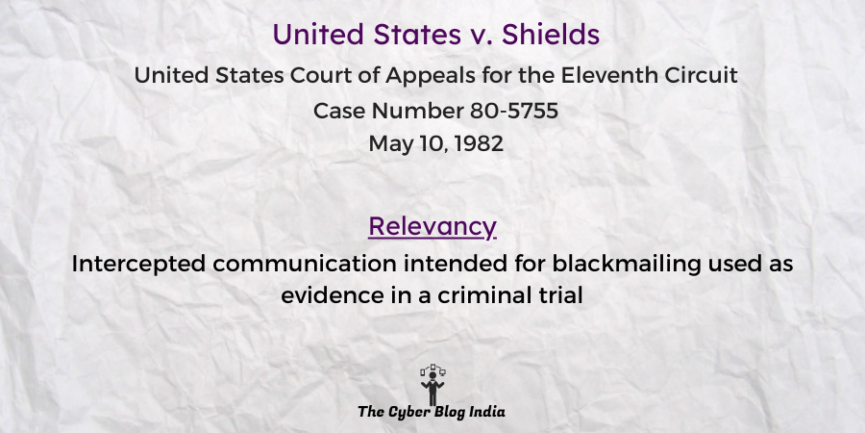United States v. Shields

United States v. Shields
675 F.2d 1152
In the United States Court of Appeals of the Eleventh Circuit
Case Number 80-5755
Before Circuit Judge Tjoflat, Circuit Judge Hill and Circuit Judge Anderson
Decided on May 10, 1982
Relevancy of the case: Intercepted communication intended for blackmailing used as evidence in a criminal trial
Statutes and Provisions Involved
- Interference with commerce by threats or violence, 18 USC § 1951
- Interstate and foreign travel or transportation in aid of racketeering enterprises, 18 USC § 1952
- The Federal Wiretapping Act, 18 USC § 2511-2515
Relevant Facts of the Case
- Florida adopted the Environmentally Endangered Lands Program to acquire land for parks and preserves. The Interagency Advisory Committee (IAC) recommended acquisitions to the governor and his cabinet, with the defendant’s friend and a real estate broker.
- Real estate broker Mclver and the second defendant agreed on a $100,000 commission if the defendant got the right to sell the Seminole Ranch tract to Florida. He obtained the right in May and stood to make a $960,000 commission if the sale went through.
- The governor and cabinet accepted the IAC’s recommendation that the state acquire the property.
- The second defendant conveyed to Mclver that the first defendant wanted half of Mclver’s sales commission; Mclver resisted.
- The second defendant employed Andrews, a private detective, to obtain recordings of his conversations with the first defendant. An FBI agent gave him a body tape recorder and radio transmitter.
- During the recorded meeting, the first defendant specifically insisted on receiving half of the $100,000 payable. The FBI recorded and intercepted the conversation between the first and second defendants on several occasions.
Prominent Arguments by the Counsels
- The first defendant’s counsel contended that the interception was illegal and warrantless, violating his Fourth Amendment rights.
Opinion of the Bench
- Andrews had control over the equipment and acted under the colour of law.
- Since someone solicited and invited Andrews’ activities, he possessed “prior authority” to conduct the interception. Additionally, they considered that he fulfilled the voluntary consent requirement.
Final Decision
- The court upheld the conviction.
Sreekutty R, an undergraduate student at National Law University Odisha, prepared this case summary during her internship with The Cyber Blog India in May/June 2023.
